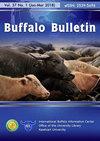Detection of subclinical ketosis in dairy buffalo herds of Tehsil Jhang, Punjab, Pakistan
IF 0.2
4区 农林科学
Q4 AGRICULTURE, DAIRY & ANIMAL SCIENCE
引用次数: 0
Abstract
Bovine ketosis is a major metabolic disorder emerging as a result of negative energy balance in the post calving period and subsequent lactation of lactating dairy animals. The ketone bodies (beta-hydroxybutyrate, acetoacetate and acetone etc.) are accumulated that can be detected in milk, blood, and urine samples. The present study was accomplished to sort out the frequency of bovine ketosis in dairy buffalo herds during the first 2 months of lactation in buffalo to detect bovine ketosis. For this purpose, blood, and urine samples (n=50) were randomly collected from private dairy farms (n=5) having buffalos as a pilot study employing commercial test strips i.e., Free Style Optium β-ketone test strips (Abbot Healthcare, Pvt. Ltd. UK) for blood and JusChek (Muenster, Germany) for urine analysis. Resultantly, as a whole prevalence of bovine ketosis found using blood sample was 18% and via urine was 12% that indicates high prevalence of subclinical ketosis during 2nd month of lactation. Animals in the age group of 5 to 7 years were found to be significantly more susceptible (P<0.05) with an incidence of 37.5%. The results revealed that a significant subclinical ketosis exists in the dairy buffaloes, which causes decreased production associated with significant economic loss to the farmers. It was concluded that a moderately high incidence of sub clinical bovine ketosis predominates in the study area which may be curtailed by early diagnostic and remedial approaches using field tests to save the economics of the farmers.巴基斯坦旁遮普省Tehsil Jhang奶牛群亚临床酮症的检测
牛酮症是一种主要的代谢性疾病,是由于产犊后期和哺乳动物随后的负能量平衡而出现的。酮体(β -羟基丁酸酯、乙酰乙酸酯和丙酮等)积聚,可在牛奶、血液和尿液样本中检测到。本研究的目的是在水牛哺乳期的前2个月对奶牛群中牛酮症的发生频率进行分类,以检测牛酮症。为此,从拥有水牛的私人奶牛场(n=5)随机收集血液和尿液样本(n=50)作为试点研究,使用商业试纸,即Free Style Optium β-酮试纸(Abbot Healthcare, Pvt. Ltd.)。英国)的血液和JusChek(明斯特,德国)的尿液分析。结果,总体而言,通过血液样本发现的牛酮症患病率为18%,通过尿液发现的牛酮症患病率为12%,这表明在哺乳期第2个月亚临床酮症的患病率很高。5 ~ 7岁年龄组的动物更容易感染(p < 0.05),发病率为37.5%。结果表明,奶牛存在明显的亚临床酮症,导致产量下降,给养殖户造成重大经济损失。结论是,亚临床牛酮症在研究地区占主导地位,可通过使用现场试验的早期诊断和补救方法来减少这种发病率,以节省农民的经济。
本文章由计算机程序翻译,如有差异,请以英文原文为准。
求助全文
约1分钟内获得全文
求助全文
来源期刊

Buffalo Bulletin
AGRICULTURE, DAIRY & ANIMAL SCIENCE-
CiteScore
0.50
自引率
0.00%
发文量
53
审稿时长
>12 weeks
期刊介绍:
Buffalo Bulletin is published quarterly in January-March, April-June, July-September and October-December. Contributions on any aspect of research or development, progress reports of projects and news on buffalo will be considered for publication in the bulletin.
 求助内容:
求助内容: 应助结果提醒方式:
应助结果提醒方式:


